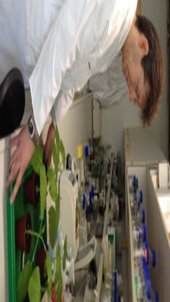Production technology for ZMapp comes from Saxony-Anhalt

High-tech research by Icon Genetics and Nomad Bioscience is world renown
Icon Genetics and Nomad Bioscience are two high-tech companies based in Halle/Saale that develop production technologies for manufacturing biopharmaceuticals and low-cost proteins. Areas of application are molecular biology and biotechnology. The production method with which ZMapp is manufactured in the USA comes from Halle. The Investment and Marketing Corporation Saxony-Anhalt spoke to the founder of the companies, Dr Yuri Gleba.
You founded Icon Genetics in the USA in 1999 and later relocated to Halle in Saxony-Anhalt. In 2008 you set up your second company Nomad Bioscience, also located in Halle. What are your reasons for choosing this location?
As a member of the German National Academy of Sciences Leopoldina, I visited Halle many times after German reunification as I have many colleagues at both the university and the Leopoldina. It therefore seemed logical to consider relocating Icon here from the USA. I have never regretted this decision. The city of Halle and the state of Saxony-Anhalt have developed good partnerships. The infrastructure here is excellent for small high-tech companies, such as Biozentrum Halle GmbH or Bio Mitteldeutschland GmbH. We work together with the Leibniz Institute of Plant Genetics and Crop Plant Research in Gatersleben and the Leibniz Institute of Plant Biochemistry in Halle as well as the Martin Luther University Halle-Wittenberg.
How many people are employed at Icon Genetics and Nomad Bioscience?
We have 33 employees at both research companies in Halle. With the exception of two managers, they are all engaged in high-tech scientific work in the fields of molecular biology and biotechnology. The vast majority of scientists and specialists that we have employed in recent years graduated from the Martin Luther University Halle-Wittenberg.
What synergies can your two companies make use of with the settlement at the same location?
By using similar technologies, which are applied in different fields, we can make the most of the expertise of all our scientists. Our researchers are all equally qualified for the exhaustive assignments. Both companies can therefore contract out assignments with one another. This provides a cash flow for a more financially stable company.
In the meantime, Icon Genetics GmbH had been acquired by the Leverkusen pharmaceutical company Bayer. How did that come about?
The Leverkusen pharmaceutical company Bayer acquired the Icon company in 2006 because the company was planning a cancer vaccine that, according to those responsible, would best be manufactured within our production conditions. I continued working as the managing director. Bayer later decided to discontinue the development of this substance. The company therefore no longer had any use for the production technology of Icon. My other company Nomad Bioscience bought back Icon Genetics GmbH in 2012.
Do you still collaborate with Bayer?
There is extensive cooperation between the Icon parent company Nomad Bioscience and Bayer CropScience. BCS is our strategic partner in the field of agriculture.
In which business area does your second company Nomad Bioscience operate?
Nomad Bioscience develops technologies for the production of industrial enzymes and biomaterials which are used in food safety and agriculture. In contrast, Icon serves human and veterinary health and is active in the defence against biological agents. Both companies use similar production platforms. But while Nomad focuses on the production of low-cost proteins, Icon focuses on high-quality biopharmaceuticals.
Icon is currently causing a stir with the ZMapp drug against Ebola. It is manufactured in the USA based on the technology that your company has developed.
We have developed a biotechnology, with which the molecular blueprint for antibodies is introduced into tobacco plants. Tobacco mosaic virus and agrobacterium induce the tobacco plant to mass-produce antibodies under suitable greenhouse conditions. The antibodies can then be harvested from the leaves after about one month. This patented method is now used by some drug manufacturers as well as for the production of Ebola medicine.'
Who does this include?
Mapp Pharmaceuticals from the USA develops the antibody mixture. KBP, also from the USA, have the production capacity to manufacture ZMapp compounds (currently in limited quantities).
Do your two companies in Halle have other economic or scientific cooperation projects, either nationally or internationally?
Both Nomad Bioscience and Icon Genetics have several large companies in the USA, Germany and Japan as their customers. Due to mutual agreement, we cannot disclose the company names.
About Dr Yuri Gleba:
The scientific career of Dr Yuri Gleba began in the former Soviet Union (PhD from Kiev in 1975, professor and additional doctorate in Leningrad in 1989). He worked at the Ukrainian Academy of Sciences in Kiev from 1975 to 1991. He moved with his family to the USA in 1991 and joined American Home Products in Princeton. There he worked as department manager for plant biotechnology. He left the company in 1999 and founded Icon Genetics, which was later relocated to Germany. Gleba heads Icon Genetics GmbH in Halle as well as Nomad Bioscience GmbH, which was founded in 2008. He also manages the company Nomads in Vilnius, Lithuania.
